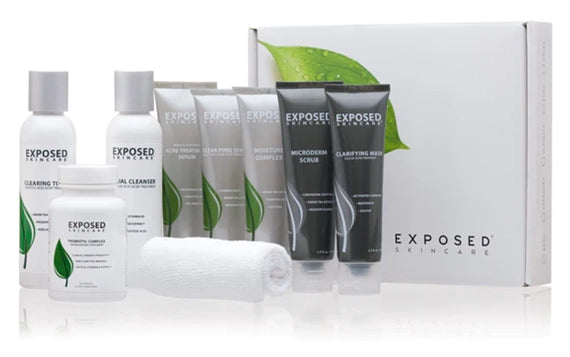Arnica montana, a herb belonging to the sunflower family, has gained significant popularity as a remedy for various ailments ranging from bruises to sore muscles.
However, with its rising prominence in skincare products, many have started to consider arnica for acne. But is this a wise choice? This article explores five reasons why using arnica for acne might not be the best decision.
Also read: How to choose the best acne treatment
Biggest Take-Aways:
- Arnica, while beneficial for conditions like bruises, isn't directly effective against the root causes of acne.
- Some individuals, especially those with sensitive skin, might experience irritation from arnica.
- A holistic skincare approach is essential, and while arnica can be a component, it shouldn't be the primary acne treatment.
- Exposed Skin Care provides a dedicated and comprehensive solution for acne, ensuring targeted treatment for clearer skin.

5 Reasons Why Arnica Is Not Best for Acne
Arnica and Its Anti-Inflammatory Properties
While arnica is often hailed for its anti-inflammatory properties, its application for acne-prone skin remains a topic of debate. Acne is an inflammatory skin condition. At first glance, it might seem logical to use an anti-inflammatory remedy like arnica gel or cream to soothe the inflamed skin.
However, acne is a complex condition. While arnica helps reduce inflammation in bruises or sore muscles, it doesn't directly address the root causes of acne.
Another factor to consider is that arnica can cause skin irritation or allergic reactions in some individuals. This is especially crucial for people with sensitive skin. Instead of soothing the skin, arnica might exacerbate the redness and irritation, especially if it is undiluted.
Arnica's Main Domain: Bruises and Muscle Soreness
The benefits of arnica for the skin primarily revolve around reducing redness and swelling associated with bruises. It's a natural remedy with pain-relieving and anti-inflammatory effects. However, these benefits don't necessarily translate well when considering arnica for acne.
It's essential to differentiate between various skin conditions. For instance, eczema might benefit from the hydration properties of a cream containing arnica, but oily skin prone to acne could react negatively to the same product.

Composition Matters: Ingredients in Arnica Products
Not all products containing arnica are created equal. The composition of these products plays a crucial role in determining their efficacy for acne treatment. While arnica extract is the star ingredient, many products contain other active ingredients.
Some might hydrate the skin, while others might cause it to become inflamed. It's important to understand the entire ingredient list and not just focus on the benefits of arnica.
Arnica oil, gel, or ointment must be appropriately diluted before applying to the skin. A small amount of arnica might soothe minor skin irritations, but applying it liberally without proper knowledge could irritate the skin further.
Misunderstanding the Role of Arnica in Skincare Routine
While arnica has its place in the skincare world, misconceptions can lead individuals astray when using it for acne.
Skincare is often about synergy. Combining arnica with certain other skincare products might negate its benefits. For instance, a strong acne treatment serum followed by an arnica gel might not yield the best results due to conflicting active ingredients.

While arnica can help soothe skin under certain circumstances, it should not replace established acne treatments. Relying solely on arnica for skin health, especially for acne-prone skin, might lead to disappointment.
The Sunflower Connection: Arnica's Origins and Limitations
Arnica montana, often called mountain arnica, grows in the mountains of Europe. It is part of the sunflower family, and understanding its origins can provide insights into its limitations.
While many plants in the sunflower family, like sunflower itself, offer hydration benefits, arnica primarily focuses on treating bruises and reducing inflammation. This distinction is vital when considering arnica for skin conditions like acne.
While arnica is a natural remedy with multiple benefits for the skin, it's essential to realize that "natural" doesn't always equate to "beneficial for all skin types." Arnica is typically safe for many applications but might not be the best choice for acne-prone skin.
The Power of Exposed Skin Care in Managing Acne
While using arnica for acne has limitations, turning to dedicated skincare products can be a game-changer. Exposed Skin Care offers a compelling range of solutions tailored to address acne.
Here are some compelling benefits of Exposed Skin Care:
- Targeted for Various Skin Types: Whether dry or irritated skin, Exposed Skin Care caters to all, ensuring it's safe for all skin types.
- Active Ingredients: Unlike the uncertainty surrounding the active ingredients in arnica supplements, Exposed Skin Care products list their components, providing transparency and trust.
- Holistic Approach: Arnica is used in many homeopathic remedies. However, the effects of arnica might not be sufficient to treat acne on its own. Exposed Skin Care offers a comprehensive approach.
Turning to dedicated skincare products, like Exposed Skin Care, can ensure that the benefits for skin are maximized and challenges minimized.
Conclusion
Arnica, a natural remedy with a rich history, has been heralded for its potential in skincare. Known for its anti-inflammatory properties, it has traditionally been applied to treat conditions like bruises and minor irritations.
The perennial nature of the arnica flower hints at its time-tested benefits. However, when it comes to the complexities of acne, arnica alone might not suffice. While beneficial in calming certain skin conditions, its properties don't necessarily address the deeper causes of acne.
As we navigate the intricate realm of skincare, it's crucial to understand the specific needs of our skin and the properties of the ingredients we use. While arnica offers certain advantages, not every natural remedy can tackle all skin concerns.
Hence, dedicated solutions like Exposed Skin Care come into play. Tailored to target acne, it exemplifies the importance of specialized treatments in ensuring our skin's optimal health.
FAQs
Why isn't arnica recommended as a primary treatment for acne?
While arnica has anti-inflammatory properties beneficial for bruises and sore muscles, it doesn't directly address the root causes of acne.
Is arnica safe for all skin types?
Arnica is generally safe, but some individuals, especially those with sensitive skin, may experience irritation or allergic reactions.
Can I use other skincare products with Arnica?
Yes, but it's essential to understand the ingredient combinations to avoid potential negative reactions.
How should I apply arnica gel or cream?
Applying a small amount to the affected area is recommended, ensuring it doesn't cause any irritation.
How does Exposed Skin Care help with acne?
Exposed Skin Care offers a comprehensive approach tailored for acne, using ingredients specifically targeting the condition, providing a more effective treatment than arnica alone.


















